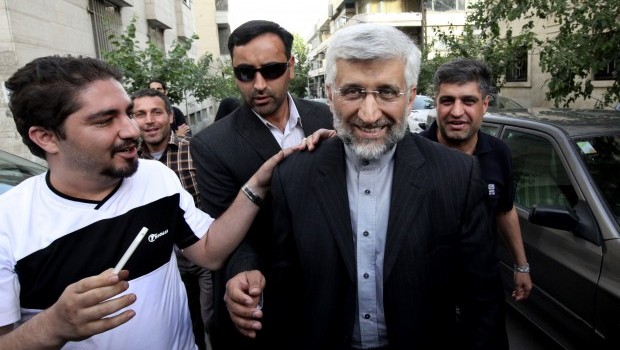
In this Wednesday, May 29, 2013 file photo, Iranian presidential candidate Saeed Jalili, center right, Iran’s top nuclear negotiator, arrives at a campaign rally attended by his female supporters in Tehran, Iran. (AP Photo/Vahid Salemi, File)
Although mostly known outside of Iran as the country’s chief negotiator in the dispute over Iran’s nuclear program, Jalili is widely perceived within Iran as one of the favored candidates of Iran’s loyalist conservatives, known as “principalists,” who once flocked to the banner of Mahmoud Ahmadinejad.
However, Ahmadinejad has since lost favour with this faction, in large part because he fell out with Iran’s supreme leader, Ayatollah Ali Khamenei.
Several incidents on the campaign trail have caused observers to draw comparisons between Jalili and Ahmadinejad before his fall from grace. During a recent campaign stop in the seminary city of Qom, Jalili respectfully adjusted a microphone for Ayatollah Mohammad Taghi Mesbah-Yazdi, the man once considered the spiritual mentor of Ahmadinejad.
Mesbah-Yazdi, in turn, endorsed Jalili last week, after his chosen candidate was disqualified from the race by the Guardian Council. In a statement reported by Iran’s Fars news agency, he said: “Our group evaluated the candidates on different factors, but supporting Islamic values were the determining factor for us…. After Mr. Lankarani (who will not be on the ballot), we believe Mr. Jalili is the best candidate that represents the Islamic values…. We hope he would be a good assistant to the supreme leader as well.”
There has also been growing speculation in Iran that President Ahmadinejad himself is considering throwing his support behind Jalili, after his confidant and one-time senior aide Esfandiar Rahim Meshaei was also disqualified.
Principalist lawmaker Mohammad Reza Bahonar said that he sees some similarities between the two men, though there are no signs of cooperation between them.
He said: “I’m not saying that the Ahmadinejad and Jalili sat in a meeting and formed a coalition. Obviously Ahmadinejad supports a candidate that supports him back; or backs a candidate that does not do any harm to him.”
“When I say Ahmadinejad supports Jalili, I do not mean that they agreed on a particular matter. I simply think Ahmadinejad and Jalili have the same blood type,” he added.
Iranian Student News Agency (ISNA) also reported that supporters of President Ahmadinejad’s have initiated a campaign in support of Jalili. The People’s Government Continuity Headquarters released a statement saying: “We find Mr. Jalili the best candidate to continue the causes of the current government and barring the country from returning to what it was before 2005.”
President Ahmadinejad’s brother, Davoud, an opponent of his sibling’s policies, has also issued a warning that Jalili’s policies are in some ways similar to those of his brother.
“Mr. Jalili will go the same way as Ahmadinejad, and everybody must be careful about it,” he told the Mehr News Agency.
In response, Saeed Jalili’s campaign has attempted to distance him from the outgoing president, who is barred from serving more than two consecutive terms by the Iranian constitution.
Ali Baqeri, the head of Jalili’s presidential campaign headquarters, dismissed any speculation in this regards, saying: “Mr. Jalili’s background clearly shows that he has always been committed to velayat-e faqih [“rule by Islamic jurists,” in effect by Iran’s current supreme leader, Ayatollah Khamenei]. We will definitely see the reflection of his beliefs in his performance.”
As the electoral campaign in Iran proceeds, the judicial system and the government continue monitor the media closely. The newspaper Iran, an official title funded by the presidency, was recently ordered by the courts to cease publication for six months, a sign of the ongoing struggle between Ahmadinejad and Iran’s conservatives.
Iranian media say that the reason given was false reporting, although no particular article was mentioned in regards to the ban. The newspaper has a one-month window to appeal.
